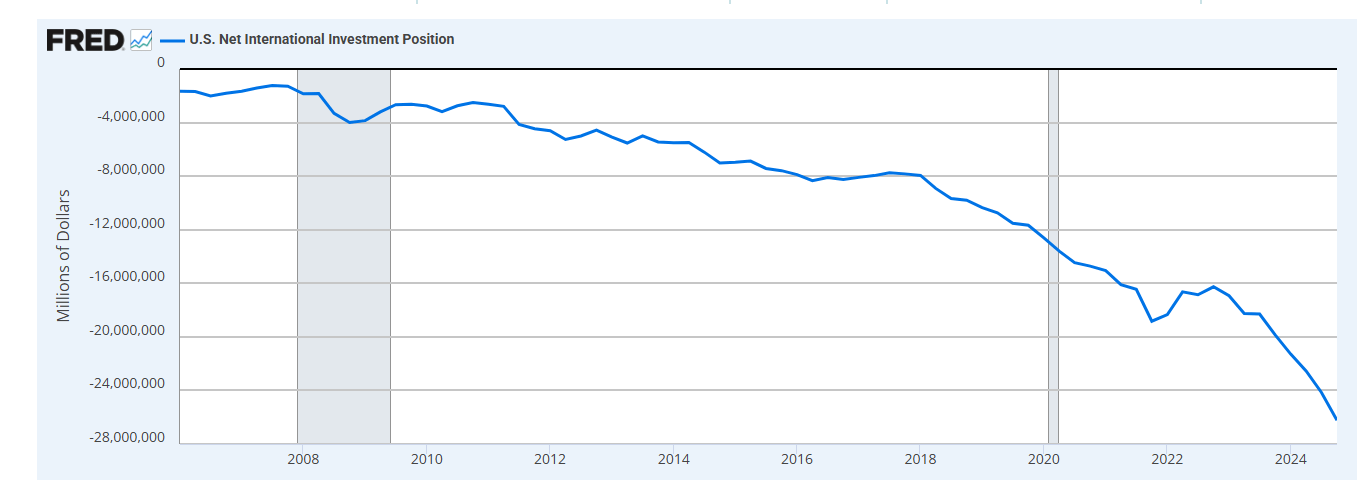The dollar’s weakening occurred after President Donald Trump told reporters he would send letters to trading partners outlining new tariff rates. This occurred as investors were digesting both the mid-June trade truce between the U.S. and China, and escalating tensions between Israel and Iran.
U.S. Dollar Has Depreciated Against Major Currencies
The dollar has depreciated by nearly 10% this year on a trade-weighted basis against key currencies. Moreover, it remains under pressure against the euro, even though the European Central Bank (ECB) has cut interest rates by two percentage points over the past year while the Federal Reserve (Fed) has kept U.S. interest rates unchanged.
This development indicates that global investors are now requiring a greater interest-rate premium to hold U.S. dollar-denominated assets than they did previously.
Looking ahead, the ECB is nearing the end of its easing cycle while the Fed could lower rates if the U.S. economy weakens in response to higher tariffs and supply chain disruptions. If so, it could diminish the dollar further, although the impact on financial markets would likely be benign.
Shifting Perceptions of U.S. Markets
Two other possibilities, however, could be more troubling for U.S. financial markets.
One risk is that global investors are now questioning whether America is a reliable partner on trade and security issues, and they are assessing whether the U.S. is as attractive an investment haven as in the past.
The change in perception is occurring when the net international investment position of the U.S. is at an all-time low (see Figure 1 below). This metric captures the difference between U.S. residents’ foreign financial assets and liabilities (including stocks, bonds, and tangible assets). For example, The Economist reports that at the end of 2024, foreigners owned $62 trillion worth of American assets (including derivatives) compared with $36 trillion owned abroad by Americans. This represents a net deficit position for the U.S. of $26 trillion, equivalent to 90% of GDP.
Figure 1.

Source: U.S. Bureau of Economic Analysis via FRED. Shaded areas indicate U.S. recessions.
This does not necessarily mean the U.S. will encounter difficulty attracting international capital to finance its trade and budget imbalances. As the October 7, 2024, FRED blog explains, the deficit in the U.S. net international investment position widened steadily since the 2008 financial crisis, yet the dollar was strong throughout most of the period. The primary reason is that U.S. equity valuations increased substantially compared to international equities. Consequently, the dollar strengthened as foreign investors were attracted by the favorable performance of U.S. stocks.
Recent developments, however, suggest global markets may be at a turning point: Foreign equities have outperformed U.S. stocks while the dollar has weakened so far this year.
A Turning Point for Capital Flows?
This became a concern in early April, when U.S. stocks and bonds plummeted along with the dollar after Trump announced reciprocal tariffs on America’s trading partners. It forced Trump to grant a 90-day waiver in implementing the tariffs and it incented him to strike a trade deal with China.
While these actions were well received by investors, a new issue has surfaced recently. Namely, a provision in the budget bill House Republicans passed in May could lower returns foreign investors earn on their U.S. assets.
How Section 899 Could Impact Foreign Investment
Section 899 of the House bill would authorize the U.S. Treasury to impose penalties on “applicable persons” from “discriminatory countries” by increasing U.S. federal income tax and withholding rates incrementally from 5% up to 20% on their U.S. investments. The tax would apply to dividends paid to foreign shareholders, profits from foreign firms based in the U.S., and proceeds earned by foreigners on property sales in the U.S.
The provision targets countries with “unfair foreign taxes” such as digital services taxes imposed by some EU members and the U.K. that mainly impact U.S. tech giants. It could also apply to countries that tax U.S. multinationals that have operations in tax havens. This appears to be an attempt by the Trump administration to undo the OECD Global Tax Deal that established a global minimum corporate tax rate of 15% for large multinational corporations.
Because the Section 899 provision penalizes investment and business income earned by foreigners, critics view it as a “revenge tax” that Trump could use to pressure countries in trade negotiations.
In his congressional testimony June 11, Treasury Secretary Scott Bessent supported the proposal on grounds that it was necessary to defend U.S. fiscal sovereignty. He said, “This bill will allow us to prevent our corporate revenues from being drained into foreign treasuries, and that is in the hundreds of billions of dollars.” According to the scoring for the tax bill, the provision could raise $116 billion in federal revenues over 10 years.
U.S. Treasuries probably will be exempted from Section 899. However, foreign buyers, who collectively hold $9 trillion of Treasury bonds, could be wary of the rules being changed in the future. If so, the cost of financing the massive federal budget deficit could be higher.
Financial markets have yet to react to the provision, likely because it is obscure, and it may be modified in the Senate. However, other proposals reportedly are under consideration that include taxing sovereign wealth funds and possibly invoking Section 891 of the tax code. The latter would grant the President authority to double tax rates on citizens and corporations of foreign countries that are deemed to be subject to discriminatory or extraterritorial practices.
Amid this, investors are left wondering whether, after launching a global trade war, the U.S. government is opening a new front on taxes that could impact the flow of international capital. While it is too soon to tell, such moves have added to the uncertainty surrounding U.S. international policies.
A version of this article was posted to Forbes.com on June 16, 2025.



























